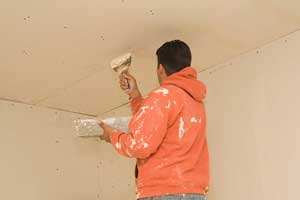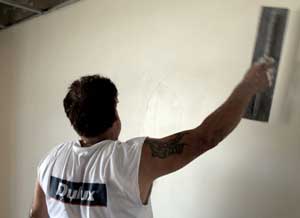Plasterer (Interior)
Tasks & duties

Interior plasterers may do some or all of the following:
-
look at the plans and specifications made by the architects and draftspeople
-
advise clients on suitable products to use
-
erect mobile scaffolding if it is under five meters high
-
use stilts or walking frames to reach heights
-
install plasterboard and plaster fixtures
-
install scotias (wall and ceiling junctions) such as coving, and decorative cornices
-
mix or use pre-made plasters such as chemical set compounds and air drying compounds
-
manufacture and install fibrous sheets
-
apply plaster to the manufacturer's specifications
-
sand the finished area
-
clean up after the job
-
run their own business
Specialisations
Interior plasterers may specialise in plasterboard fixing or stopping, or using fibrous plaster. They may also specialise in making and installing decorative mouldings and cornices.
Skills & knowledge

Interior plasterers need to have:
-
knowledge of plastering materials, compounds and equipment
-
practical skills, including skill using a trowel to apply plaster
-
problem-solving skills
-
organisational ability, as plastering is a step-by-step process
-
good communication skills
-
knowledge of past and present decorating styles
-
some knowledge of the construction industry
-
knowledge of competitors' prices and services
-
basic maths skills
Entry requirements
There are no specific entry requirements to become an interior plasterer, although most employers prefer you to do an apprenticeship and gain a National Certificate in Interior Systems. This qualification allows you to specialise in areas such as fibre cement fixing, fibre cement finishing, fibrous plaster, fibrous plaster manufacture and plasterboard finishing.
For further information contact the Building and Construction Industry Training Organisation.
Secondary education
At least three years of secondary education is recommended. Useful subjects include maths and English.
Training on the job
Interior plasterers keep up to date with developments in the industry and learn about new products by reading manuals accompanying new products and attending industry conferences.
Useful experience
Previous experience in the building construction industry, work using hand tools or work as a carpenter may be useful.
Related courses
Ceiling, Wall and Floor Fixing
Plastering
For more information, please refer to Career Services.
Document Actions
